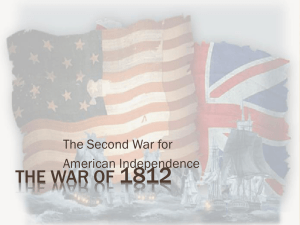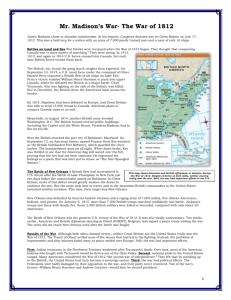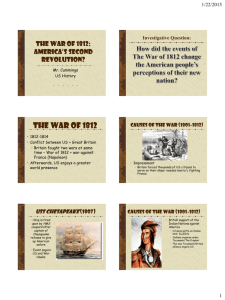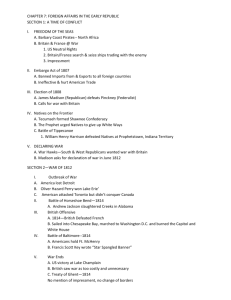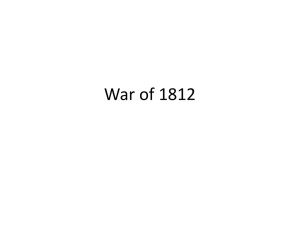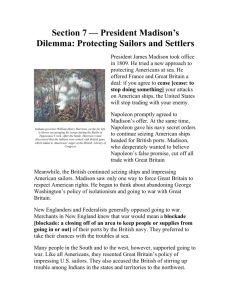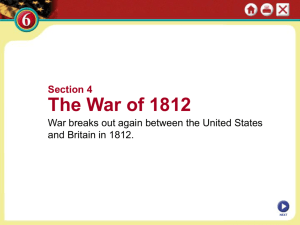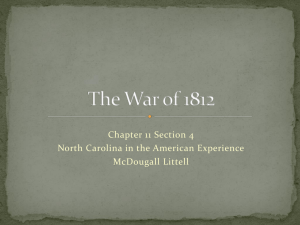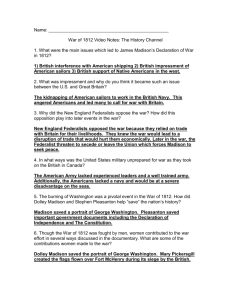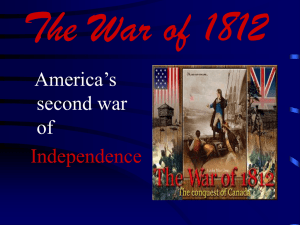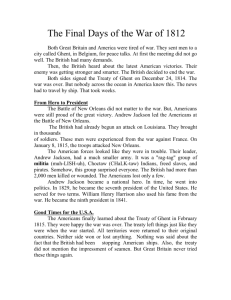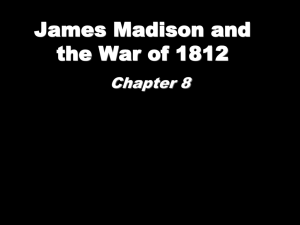War of 1812 Facts
advertisement
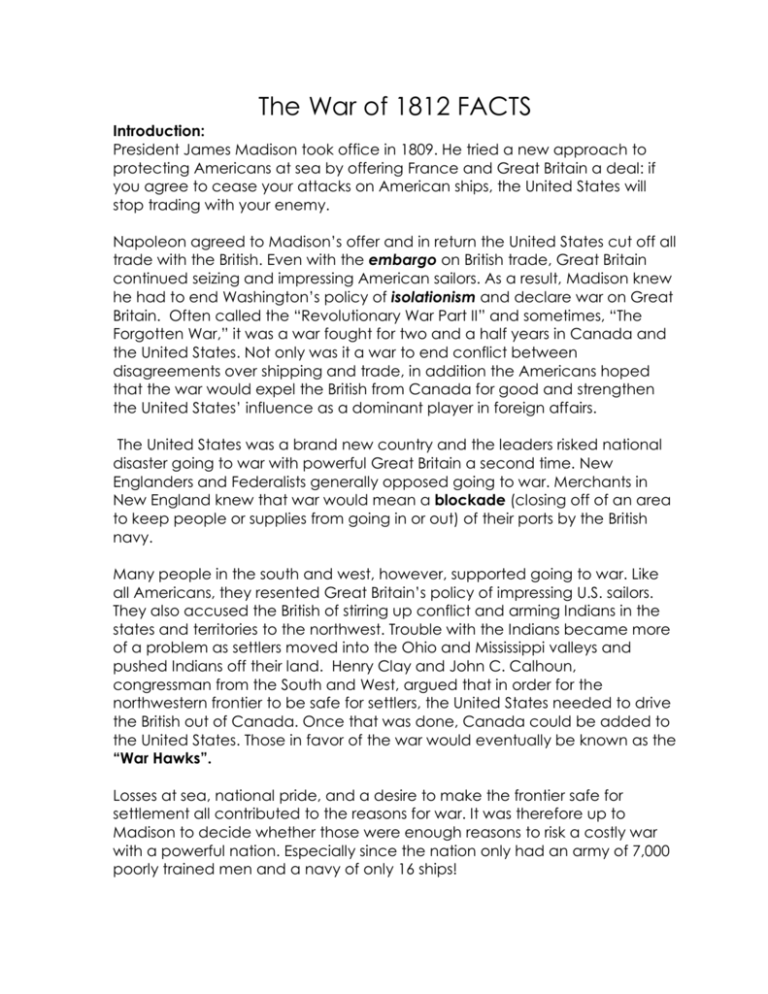
The War of 1812 FACTS Introduction: President James Madison took office in 1809. He tried a new approach to protecting Americans at sea by offering France and Great Britain a deal: if you agree to cease your attacks on American ships, the United States will stop trading with your enemy. Napoleon agreed to Madison’s offer and in return the United States cut off all trade with the British. Even with the embargo on British trade, Great Britain continued seizing and impressing American sailors. As a result, Madison knew he had to end Washington’s policy of isolationism and declare war on Great Britain. Often called the “Revolutionary War Part II” and sometimes, “The Forgotten War,” it was a war fought for two and a half years in Canada and the United States. Not only was it a war to end conflict between disagreements over shipping and trade, in addition the Americans hoped that the war would expel the British from Canada for good and strengthen the United States’ influence as a dominant player in foreign affairs. The United States was a brand new country and the leaders risked national disaster going to war with powerful Great Britain a second time. New Englanders and Federalists generally opposed going to war. Merchants in New England knew that war would mean a blockade (closing off of an area to keep people or supplies from going in or out) of their ports by the British navy. Many people in the south and west, however, supported going to war. Like all Americans, they resented Great Britain’s policy of impressing U.S. sailors. They also accused the British of stirring up conflict and arming Indians in the states and territories to the northwest. Trouble with the Indians became more of a problem as settlers moved into the Ohio and Mississippi valleys and pushed Indians off their land. Henry Clay and John C. Calhoun, congressman from the South and West, argued that in order for the northwestern frontier to be safe for settlers, the United States needed to drive the British out of Canada. Once that was done, Canada could be added to the United States. Those in favor of the war would eventually be known as the “War Hawks”. Losses at sea, national pride, and a desire to make the frontier safe for settlement all contributed to the reasons for war. It was therefore up to Madison to decide whether those were enough reasons to risk a costly war with a powerful nation. Especially since the nation only had an army of 7,000 poorly trained men and a navy of only 16 ships! On July 17, 1812, Congress declared war on Great Britain. War Hawks were overjoyed. They believed that conquering Canada was simply a matter of marching into Canada. However, they were wrong. In 1812, 1813, and 1814, British forces repeatedly pushed them back. However, the British too faced opposition from the American force. On September 10, 1813 a naval commander Oliver Perry captured a British fleet of six ships on Lake Erie. Perry’s victory enabled William Henry Harrison to push into upper Canada where he defeated the British in a major battle. Chief Tecumseh, who was fighting on the side of the British, was killed. But in December, the British drove the Americans back across the border. By 1814, Napoleon had been defeated in Europe, and Great Britain was able to send 15,000 troops to Canada. American plans to conquer Canada came to an end. Meanwhile, in August 1814, another British army invaded Washington, D.C.. The British burned several public buildings including the Capitol and the White House. President Madison had to flee for his life. Next the British attacked the port city of Baltimore, Maryland. On September 13, an American lawyer named Francis Scott Key watched as the British bombarded Fort McHenry, which guarded the city’s harbor. The bombardment went on all night. When dawn broke, Key was thrilled to see that the American flag still waved over the fort, proving that the fort had not been captured. He expressed his feelings in a poem that was later put to music as “The Star-Spangled Banner.” The Battle of New Orleans A British fleet had surrendered to the U.S. forces after the Battle of Lake Champlain in New York just two days before the unsuccessful attack on Baltimore. In Great Britain, news of this defeat would greatly weaken the desire to continue the war. But the news took time to travel and in the meantime British commanders in the United States launched another invasion. This time, their target was New Orleans. New Orleans was defended by General Andrew Jackson and his ragtag army of 7,000 militia, free African Americans, Indians, and pirates. ON January 8, 1815, more than 7,500 British troops marched confidently into battle. Jackson’s troops met them with deadly fire. Some 2,000 British soldiers were killed or wounded, compared to only about 20 Americans. The Battle of New Orleans was the greatest U.s. victory of the War of 1812. It was also totally unnecessary. Two weeks earlier, American and British diplomats were meeting in Ghent, Belgium. They had signed a peace treaty ending the war, however, news did not reach New Orleans until after the battle was fought. Results of the War Although both sides claimed victory, neither Great Britain nor the United States really won the War of 1812. The Treaty of Ghent settled none of the issues that had led to the fighting. Instead, the problems of impressment and ship seizures faded away as peace settle over Europe. Still, the war had important effects. First, Indian resistance in the Northwest Territory weakened after Tecumseh’s death. Over time, most of the American Indians who fought with Tecumseh would be driven out of the Ohio Valley. Secondly, national pride in the United States surged. Many Americans considered the War of 1812 as the ‘Second War of Independence.” They felt that by standing up to the British, they had truly become a sovereign nation. Third, the war had political effects. The Federalists were badly damaged by their opposition to the war and their party never recovered. Two of the war’s heroes--- William Henry Harrison and Andrew Jackson—would later become elected president.
